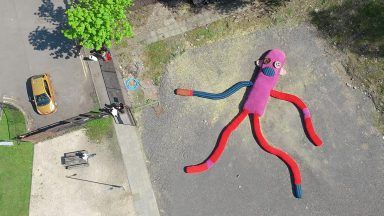A man with Parkinson’s disease said his world would be “very difficult to live in” without his nurse and has joined a plea for more specialist medics in Scotland.
Mark Coxe, 61, was diagnosed with the disease in 2013 and said the support he has had from his nurse has been life-changing.
The trust between them proved even more crucial last year, when Mark started to struggle with his mental health.
The Fife dad-of-three spoke out following a major new report from Parkinson’s UK, which warns there are not enough Parkinson’s nurses to support the growing population of people living with the complex brain condition.
The charity estimates that by 2030, the number of people with Parkinson’s in Scotland will have increased by 15% to around 15,000.
More than half of Parkinson’s nurses working in Scotland right now are also due to retire before the end of the decade.
Mark, who was diagnosed in December 2013 aged 51, told STV News: “I was depressed. I was in a bad phase – it’s not nice having Parkinson’s and sometimes everything gets on top of you.
“I walked into my appointment with my nurse, she looked at me and asked ‘what’s the matter?’ I immediately just burst into tears. She could tell straight away something was wrong.
“She drew it out of me, got me on the right medication and helped me get back to where I am.
“You can phone the Parkinson’s nurse any time and they call you back as soon as they can, depending how busy they are.
“I started the new medication and soon got back on my feet.”

Mark suspects he developed Parkinson’s around “ten years” before he was diagnosed.
His daughters raised concerns over his health after noticing he was suffering from hand tremors after he drove to Kent to visit them in 2013.
His GP referred him to for further tests including a brain scan.
He was referred to a neurologist at the Victoria Hospital in Kirkcaldy, who broke the news to him.
Mark added: “It’s not nice to hear – and I was probably in denial mode for another five years after that.”
Mark explained his symptoms range from body tremors, shakes, slurred speech and walking difficulties.
He previously worked as a shift operations manager at Forth Ports in Grangemouth though the stress of the job worsened his condition and he signed off on sick leave.
His managers created a role for him as a compliance officer when he returned six months later, which had been his area of interest at work.
“Compliance was my baby,” he added. “I was crawling up the walls and really wanted to get back to work.
“I worked another couple of years but audits were stressful and made my Parkinson’s worse. So I had to give it up.”
While many people who struggle with health conditions fear how their lives might change, Mark has thrown himself into trying new things.
Since leaving work, he began volunteering with his local Parkinson’s group, hosting pop-up cafes and activity groups to help people in the community socialise and improve their symptoms.
He helped build a better website for Parkinson’s UK and also writes a monthly newsletter.
Mark also developed a love of writing poetry, which he admitted he “despised” in his school days, and published two books which helped raise thousands of pounds for the charity.
“Parkinson’s given me all sorts of opportunities,” he said.
“I couldn’t stand poetry as a child and hated learning about it. But people with Parkinson’s often find new ways to be creative and to release tension; so I started writing during lockdown.”
He added: “And if someone told me ten years ago I’d end up building a website, I’d have laughed at you, but there you go.”
Mark is backing the Parkinson’s UK campaign for specialist medics to help meet soaring demand.
Scotland needs a minimum of 44 full-time Parkinson’s nurses covering routine patient-facing work just now, yet there are fewer than 33 full-time equivalent Parkinson’s nurses.
The charity also recommends a maximum caseload of 300 people with Parkinson’s for each full-time specialist nurse, with fewer in remote areas..
A typical nurse has around 100 more people on their caseload than they should, according to the research.
Mark said: “Parkinson’s nurses are essential.
“It’s the fastest growing neurological condition in the world. We’ll have far more people diagnosed in the next ten to 20 years.
“Without my nurse, I’d have gone downhill far more quickly.
“Seeing the same person, getting to know each other, even if you’re one of hundreds, they can spot the signs when things aren’t as they should be.
“You can talk to them about everything and, if they have to, they will get you an appointment with the person you need.
“My world would be very difficult to live in without my specialist nurse.”
Dr Julie Jones, physiotherapist and associate dean at Robert Gordon University said: “Everyone who lives with Parkinson’s has a different journey.
“Everyone experiences bumps along the way, but the frequency, intensity or the gradient of those bumps vary. It’s a very varied condition.
“Without contact with a nurse, people with Parkinson’s could easily feel lost in the middle of the complex care systems we have in Scotland.
“It can be difficult for them to navigate and that’s where the nurses have a crucial role in helping people optimise their engagement with the healthcare services.”

Dr Anne-Louise Cunnington, consultant in older people’s medicine based at Glasgow Royal Infirmary, said specialist nurses are a “lifeline” for people with Parkinson’s.
“Parkinson’s nurses support and educate, not just people with Parkinson’s and their carers, but also other health and social care professionals who often know very little about this complex condition.
“They are the link between primary care, hospital-based care and very specialist care, as well as social carers and the third sector. Parkinson’s nurses act as the advocate for patients and their carers throughout their whole journey.”
“I think perhaps we underestimate the expertise that we have in our current Parkinson’s nurses,” added Dr Jones.
“Many of the experienced nurses that we have in Scotland have been working with the Parkinson’s population for 15 to 20 years and it’s very hard, even for them, to capture the knowledge and experience they have acquired during that time.
“I am not sure we fully appreciate the extent of the wealth of knowledge they have of all the different facets of care for people with Parkinson’s.
“I am concerned that with many of these specialist nurses facing retirement, that experience will go with
them and that will be a huge loss to people with Parkinson’s and also the healthcare service as a whole.”
Tanith Muller, parliamentary and campaigns manager for Parkinson’s UK in Scotland, said: “People with Parkinson’s tell us that the most important person helping them to live with their condition is their Parkinson’s nurse.
“We are really concerned that people are struggling to get the support they need from their nurse right now.
“And these pressures will only get worse as the number of people living with Parkinson’s in Scotland continues to grow.
“Where people have insufficient support from a Parkinson’s nurse, they are less likely to be confident about self-managing their condition.
“They are also less likely to be referred to essential professionals, such as speech therapy, physiotherapy
and occupational therapy.
“This has consequences: lost independence, increasing care needs and more crisis hospital and care home admissions.”
Follow STV News on WhatsApp
Scan the QR code on your mobile device for all the latest news from around the country




























